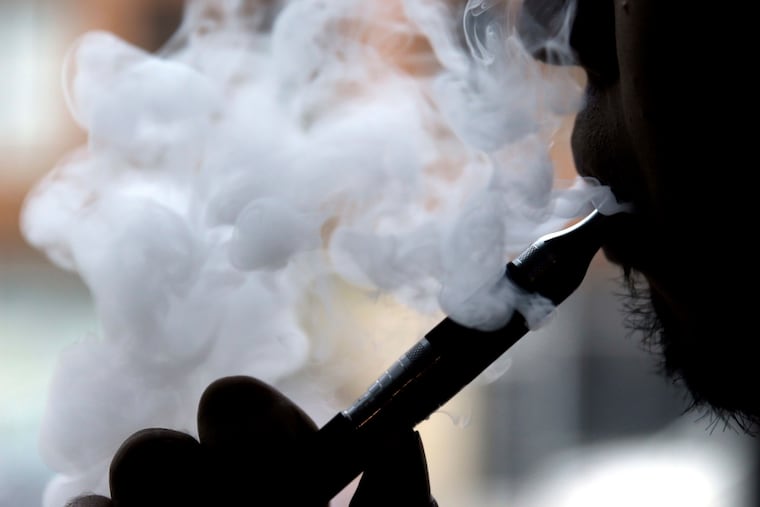Vaping, e-cigarettes linked to 215 cases of severe lung illness in 25 states, including Pa., N.J.
Healthy young adults are showing up in hospital emergency departments with symptoms consistent with pneumonia. Doctors say the culprit may be vaping.

Healthy young adults with no history of medical problems are showing up in hospital emergency departments short of breath, coughing, needing oxygen to be pumped into their lungs.
Their symptoms point to pneumonia, or smoke inhalation from being trapped in a burning house.
One by one, doctors rule out infections, viruses, autoimmune diseases, and all likely causes of such symptoms. They’re left with just one compelling culprit: vaping.
“The patients I’ve seen have been healthy, young. All have been males, and otherwise no real medical problems,” said Gautam George, an assistant professor of medicine in pulmonary and critical care at Thomas Jefferson University Hospital. “We don’t completely understand what it is about vaping that causes this constellation of symptoms.”
More than 200 cases of severe lung illness potentially related to vaping and e-cigarettes have been reported in 25 states, including Pennsylvania and New Jersey, according to the U.S. Centers for Disease Control and Prevention.
There have been 14 reported cases of people sickened in Pennsylvania and at least nine in New Jersey — primarily young adults and teenagers with no past serious medical issues.
In Illinois, one woman died after contracting a serious lung disease doctors believe was related to vaping.
On Friday, as the number of cases continued to grow, the CDC and U.S. Food and Drug Administration issued a joint statement responding to the death, and asking consumers and health care providers to report any new information that could assist with the CDC’s investigation.
“Even though cases appear similar, it is not clear if these cases have a common cause or if they are different diseases with similar presentations, which is why our ongoing investigation is critical,” said CDC director Robert R. Redfield and acting FDA Commissioner Ned Sharpless in a statement.
In a public health alert also issued Friday, the CDC urged people not to buy vaping products off the street, including cannabis oil, or alter e-cigarettes. Several cases involve patients who reported using an e-cigarette to vape a cannabinoid.
“While this investigation is ongoing, if you are concerned about these specific health risks, consider refraining from using e-cigarette products,” the CDC wrote in its alert. “We are working closely with state and local health officials to investigate these incidents as quickly as possible, and we are committed to taking appropriate actions as a clearer picture of the facts emerges.”
Officials in Milwaukee took stronger action Thursday, urging residents there to stop vaping immediately because of the recent illnesses, the Milwaukee Journal Sentinel reported.
Over the last several years, e-cigarettes have been marketed as a less dangerous alternative to combustible cigarettes that can even help people who want to quit. Fruit and candy-like flavors have made them popular among teenagers.
But e-cigarettes can contain harmful substances, such as nicotine, heavy metals, and other chemicals. They have not been approved by the FDA as an aid to quit smoking.
» READ MORE: Pregnant women may think vaping is safer than smoking, study finds
Doctors cautioned that little is known about the short-term and long-term effects of e-cigarettes.
“If it turns out e-cigarettes have a lower cancer risk, that’s a good thing ... but harm is not wholly defined by cancer risk,” said Frank T. Leone, director of Penn Medicine’s comprehensive smoking treatment programs. “This episode is really opening our eyes to that notion, that [e-cigarettes] can have their own intrinsic risk profile that looks nothing like cigarettes.”
Cigarette smokers don’t come to the emergency department with the sudden, acute symptoms in the cases being investigated by the CDC, he said.
These symptoms, Leone said, are more consistent with people who have been caught in a house fire or inhaled industrial smoke.
Leone said he has treated one patient for what he believed was vaping-related lung illness — a man in his 50s who experienced coughing, low oxygen levels, and pneumonia-like symptoms who told Leone he’d been “vaping pretty aggressively” days prior to seeking medical attention.
George said he did not know the exact number of cases he and his colleagues have seen at Jefferson.
While some have come to the emergency department in sudden and severe distress, others have experienced a gradual onset of symptoms, including nausea, vomiting, and shortness of breath, and eventually sought treatment from their primary care doctor, he said.
New Jersey and Pennsylvania health officials said they are closely monitoring the situation and ramping up efforts to reach teens.
“The big concern, especially for people age 18 to 25 who are purchasing legally, is the impact on developing brains,” said April Hutcheson, a spokesperson for the Pennsylvania Department of Health.
» READ MORE: E-cigarettes fuel another dramatic increase in nicotine use among U.S. teens
The legal age to purchase tobacco products, including e-cigarettes, in Pennsylvania is 18. Lawmakers are expected to consider legislation this fall that would raise the age to 21.
In the meantime, the Health Department launched an anti-vaping campaign that targets teens directly through advertisements on social media and video streaming services, such as Hulu, that are popular among young adults, Hutcheson said.
Just this week, New Jersey launched a webpage, VapeFactsNJ.com, with information for parents, teachers, coaches and health care professionals. The agency is promoting the resource through social media and Facebook ads.
Judith Persichilli, New Jersey’s acting health commissioner, said in a statement that she was especially concerned about the possibility that people are being sickened by vaping liquids containing THC or other chemicals.
New Jersey previously raised its age restriction on tobacco products to 21, but is considering legislation that would further restrict teens’ access to e-cigarettes, including a fine for being in possession of an e-cigarette.